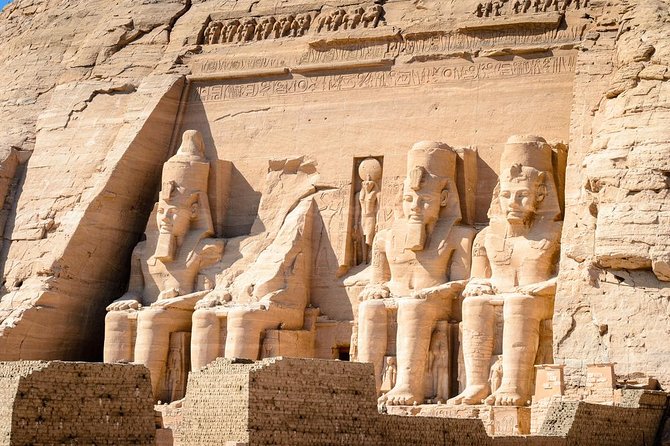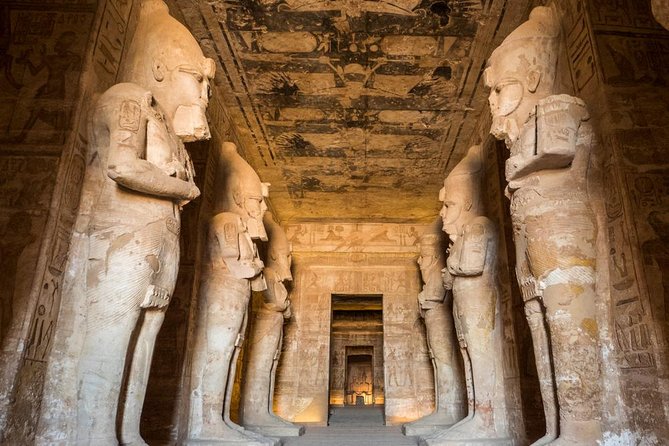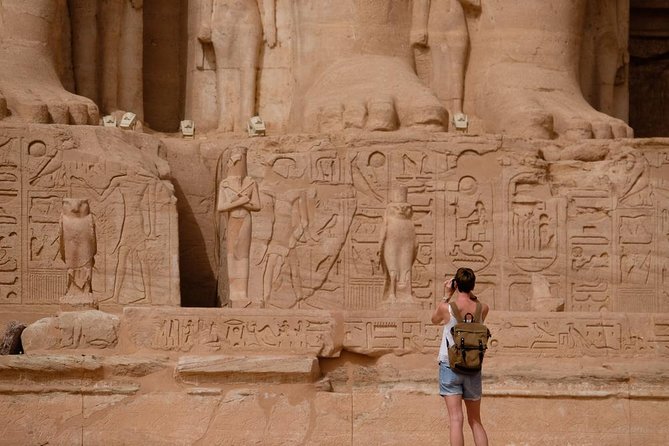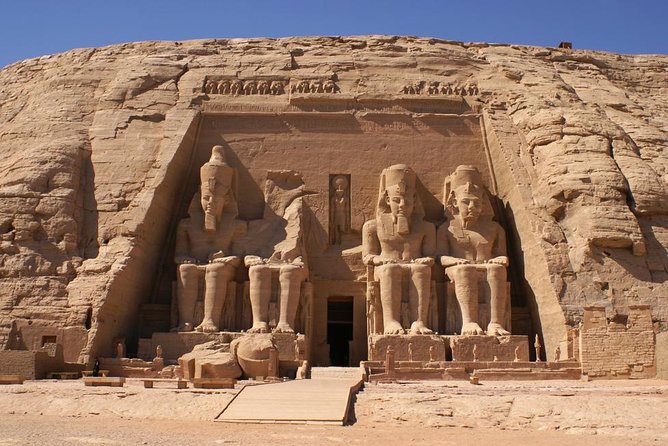Located in the heart of southern Egypt, the Abu Simbel Temple stands as a testament to the grandeur of ancient Egyptian civilization. Constructed by the legendary Pharaoh Ramesses II, this architectural marvel features colossal statues and intricate hieroglyphics that captivate visitors from around the world. While the temple’s relocation in the 1960s to prevent its submersion by the rising Nile waters is an engineering feat in itself, the true allure of Abu Simbel lies in the stories it whispers, inviting the curious to uncover the secrets of its past.
Key Points

-
The Abu Simbel temple complex, carved into the mountainside, was built by Ramesses II in the 13th century BC as a monument to himself and his wife Nefertari.
-
The temples were threatened by the rising waters of the Nile due to the Aswan High Dam construction in the 1960s, prompting a remarkable engineering feat to relocate them to higher ground.
-
The key features of the temple include colossal statues of Ramesses II at the entrance, four massive seated statues inside, and intricate hieroglyphic carvings.
-
Visitors can explore the temple complex through private tours that include round-trip transportation, knowledgeable guides, and the option to witness the sun’s alignment within the sanctuary.
-
The site is wheelchair accessible, and tours operate year-round, with recommendations for appropriate clothing and preparation due to the hot, dry climate.
Location and History

The Abu Simbel temple complex is located in southern Egypt, near the border with Sudan. The temples were built by Ramesses II in the 13th century BC as a lasting monument to himself and his queen, Nefertari.
The two temples were carved out of the mountainside and depict Ramesses II and Nefertari worshiping the sun god Ra.
In the 1960s, the temples were threatened by the rising waters of the Nile due to the construction of the Aswan High Dam. To save them, the temples were moved to higher ground, an incredible engineering feat.
Today, the Abu Simbel temples remain a stunning example of ancient Egyptian architecture and a popular tourist destination.
You can also read our reviews of more tours and experiences in Aswan.
Key Features of the Temple
Colossal statues of Ramesses II stand guard at the entrance, immediately impressing visitors with the temple’s sheer scale and grandeur.
The interior boasts four massive seated statues of the pharaoh, along with intricately carved hieroglyphics and scenes depicting Ramesses II’s victories and offerings to the gods.
The temple’s orientation is particularly noteworthy, as twice a year, on February 22 and October 22, the sun’s rays illuminate the innermost sanctuary, illuminating the statues of Ra-Horakhty, Amun, and Ramesses II himself.
The temple’s remarkable engineering and preservation, despite its relocation to higher ground, continue to captivate and inspire all who visit this iconic ancient wonder.
Visiting Abu Simbel

Visitors to the Abu Simbel temple can expect an awe-inspiring experience that transports them back in time. The private tour includes round-trip transportation from Aswan, a knowledgeable guide, and hotel pickup and drop-off.
Guests start their journey at 4 am to catch the sunrise over the temples, an unforgettable sight. The tour covers the two massive rock-cut temples, offering insights into their history and significance.
Wheelchair users can participate, and the tour operates year-round, though appropriate clothing is recommended. Booking is easy, with confirmation received upon reservation and a flexible cancellation policy up to 24 hours prior.
Tour Options and Pricing
Abu Simbel temple tours offer a range of pricing options to suit different budgets and group sizes. The private tour costs from €91.72 per person, with the price varying depending on the group size.
This tour includes private air-conditioned transportation, a private guide, and hotel pickup and drop-off in Aswan. The tour starts early at 4:00 am to avoid the crowds and heat.
While the temple is wheelchair accessible, travelers should dress appropriately for the weather conditions. Cancellations are free up to 24 hours before the experience, and a reserve now, pay later option is available.
With a 4.5-star rating from 4 reviews, the Abu Simbel temple tour is a popular choice for visitors to Aswan.
Getting to the Site
How does one get to the Abu Simbel temple site? The tour includes private air-conditioned car transfers to and from your hotel in Aswan. The temple site is located about 280 kilometers south of Aswan, and the drive takes roughly 3 hours each way. The tour starts very early, at 4:00 am, to ensure visitors arrive before the crowds and avoid the midday heat.
| Transportation | Pickup | Start Time | Duration |
|---|---|---|---|
| Private Car | Hotel | 4:00 am | 3 hours |
| Private Car | Temple | 9:00 am | 3 hours |
| Private Boat | Lake Nasser | Optional | 30 minutes |
The tour also provides the option to take a private boat across Lake Nasser for a different perspective of the temples.
- Private Day Tour to Abu Simbel Temples From Aswan
- Abusimbel& 3 Nights Nile Cruise
- 4-Days 3-Nights Cruise From Aswan to Luxor Including Abu Simbel Hot Air Balloon
- 4-Day 3-Night Nile Cruise From Aswan to Luxor – Private Tour
- Full Day Tour to Abu Simbel Temples From Aswan
- 6 Days Nile Cruise:Luxor,Aswan,Abu Simbel With Train Tickets From Cairo
What to Expect on the Tour
After the scenic 3-hour drive from Aswan, visitors arrive at the grand Abu Simbel temple complex.
The private tour guide leads the group through the massive temples, explaining the intricate carvings and the impressive scale of the structures.
Visitors marvel at the colossal statues of Ramses II and the impressive acoustics within the main temple.
The tour allows ample time to explore the site, take photos, and gain an in-depth understanding of the historical and cultural significance of this UNESCO World Heritage Site.
With a private vehicle and guide, the experience is personalized and efficient, ensuring travelers make the most of their visit to this iconic Egyptian landmark.
Tips for Visiting
Travelers visiting the Abu Simbel temple complex can maximize their experience by arriving early. The site’s popularity means it can get crowded, so getting there before the masses is ideal.
Visitors should dress comfortably and bring plenty of water, as the climate can be hot and dry. It’s also wise to use sun protection, as the temple is situated in a desert landscape with little shade.
Plus, guests should be prepared for the early departure time, typically around 4 AM. While the temple itself is well-preserved, the journey to reach it can be long and arduous, so having the right gear and mindset is crucial for an enjoyable visit.
Additional Considerations

Along With the early arrival and proper attire, visitors to the Abu Simbel temple should consider a few other factors.
The site is wheelchair accessible, making it suitable for those with mobility challenges. The tour operates in all weather conditions, so it’s essential to dress appropriately, whether it’s hot and sunny or cooler and overcast.
The temple is located near public transportation, providing convenient access for those who prefer not to drive. Most travelers can participate, but it’s always best to consult with the tour operator if you have any specific concerns.
With these considerations in mind, visitors can ensure a smooth and enjoyable experience at the majestic Abu Simbel temple.
Frequently Asked Questions
What Is the Best Time of Year to Visit Abu Simbel?
The best time to visit Abu Simbel is during the winter months, typically from November to February, when the weather is cooler and drier, making it more comfortable for sightseeing and exploring the ancient temple site.
Are Photography and Video Allowed Inside the Temple?
Photography and video are generally allowed inside the Abu Simbel Temple, but visitors should check with the tour guide or local authorities for any restrictions or special requirements. Visitors are advised to respect the temple’s sanctity and avoid disruptive behavior.
Do I Need Special Permits or Visas to Visit Abu Simbel?
Visitors to the Abu Simbel temple tour generally don’t need any special permits or visas beyond a standard Egyptian tourist visa. However, it’s always best to check with the tour operator or local authorities for the latest entry requirements.
How Long Should I Allocate for the Visit to Abu Simbel?
The overview indicates visitors should allocate about 2-3 hours to fully explore the Abu Simbel Temple. This includes time for the private guided tour, taking in the impressive ancient structures, and any additional optional activities or transportation.
Are There Any Age or Physical Restrictions for the Tour?
There are no major age or physical restrictions for the Abu Simbel temple tour. The tour is wheelchair accessible, and most travelers can participate. However, it’s recommended to dress appropriately for the weather conditions during the tour.
Recap
The Abu Simbel Temple stands as a testament to the grandeur of ancient Egyptian civilization. Painstakingly relocated to avoid submersion, this architectural marvel continues to captivate visitors with its colossal statues and intricate hieroglyphics. Exploring this historic site offers a unique window into the religious and artistic traditions of the Pharaohs. Whether visiting independently or as part of a guided tour, the Abu Simbel Temple remains a must-see destination for anyone fascinated by the wonders of the ancient world.
More Tour Reviews in Aswan
- Aswan Airport Arrival Transfer
- 3 Night Nile Cruise Aswan Luxor From Aswan With Abu Simbel
- Day Tour To Nubian Museum And Temple Of Isis In Aswan
- 2 Night Sailing Nile Cruise Including Highlights Tours In Luxor From Aswan
- 4-Days Nile Cruise Tour From Aswan to Luxor and Hot Air Balloon on M/S Le Fayan
- Aswan Botanical Garden & Private Felucca Tour
Not for you? Here's more things to do in Aswan we have recnetly reviewed
- 20 Best 4 Day Tours In Aswan
- 3 Best 2 Day Tours In Aswan
- 4 Best 3 Day Tours In Aswan
- 2 Best Full-Day Tours In Aswan
- 25 Best Cruises And Boat Tours In Aswan
- Private Trip to the Nubian Village by Motorboat in Aswan
- Abu Simbel From Aswan Include Entrance Fees
- Abu Simbel Day Trip From From Aswan
- Abu Simbel by Car
- 3-Nights Cruise Aswan to Luxor With Abu Simbel and Nubian Village
- 3 Night Deluxe Nile Cruise From Aswan to Luxor With Abu Simbel
- Egypt Nile Cruise From Aswan to Luxor 3 Nights 4 Days
